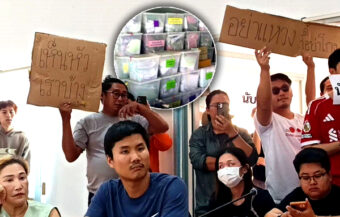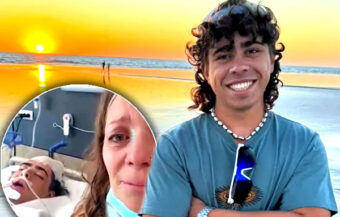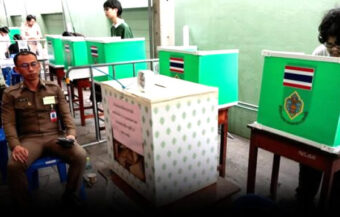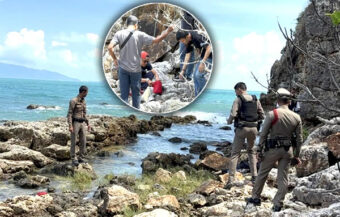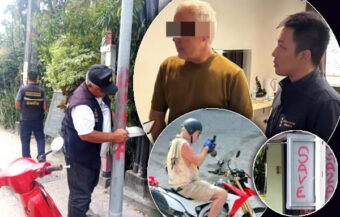A 48-year-old Russian tourist drowned off Karon Beach despite red flag warnings. He vanished minutes after entering the water with his son. Lifeguards recovered his body, but CPR failed. This is the second fatality at the beach in just 10 days.
A Russian tourist drowned on Friday morning after getting into difficulty off Karon Beach. The victim, 48-year-old Nikita Tretyakov, had come to the beach intending to swim but vanished just thirty minutes after entering the water. At the time of the incident, red flags were clearly posted along the beach, indicating that swimming was strictly prohibited due to dangerous conditions. This tragedy follows a similar incident on June 10, when an Indian tourist lost her life at the same beach.
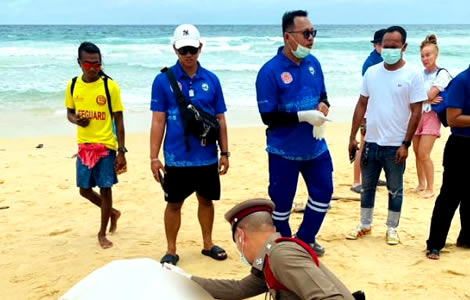
A Russian tourist tragically drowned on Saturday morning at Karon Beach, Phuket, after swimming despite clear red flag warnings. The incident happened near Karon Sports Stadium, prompting a swift response from police, lifeguards, and rescue workers. Despite their efforts, the tourist could not be saved.
At approximately 11:40 a.m., Police Lieutenant Colonel Charas Lempan of Karon Police Station received a call from the station’s radio centre. The report stated that a tourist had entered the water against red flag warnings and drowned. The red flag is a strict indicator that sea conditions are too dangerous for swimming.
Immediately after receiving the report, Lt. Col. Charas informed Police Colonel Khun Det Na Nong Khai, the Superintendent of Karon Police Station. The superintendent responded without delay, arriving at the scene along with lifeguards and rescue staff from Karon Municipality.
Lifeguards recover body from surf as shaken tourists witness the aftermath of a tragic beach drowning
When they reached the beach, rescue workers had already recovered the body from the sea. The deceased lay on the sand, covered respectfully with a white cloth. Lifeguards stood nearby, visibly shaken. Waves were still rough, and strong undercurrents were present at the site.
According to police questioning, the victim was identified as Mr. Nikita Tretyakov, a 48-year-old Russian national. He had been staying at The Beach High Hotel with his wife and son. His wife, Ms. Natalia Pišmantseva, and their 20-year-old son, Mr. Danila Tretyakov, were present during the incident.
Ms. Pišmantseva stated that the family left their hotel around 10:00 a.m. They had planned to relax by the beach and swim. Mr. Tretyakov and his son entered the water, while Ms. Pišmantseva chose to remain on the beach. The weather was overcast, and red warning flags were clearly displayed.
Despite red flags and rough surf, father and son entered the water before the tourist vanished within 30 minutes
Despite the warnings, both father and son went into the surf. Waves were high, and currents strong. Initially, they swam and played in the shallow water. However, within about 30 minutes, the situation changed suddenly. Mr. Tretyakov was no longer visible.
As soon as they realized he was missing, the family rushed to alert the lifeguards. Lifeguards immediately initiated a search operation. They scanned the waters and moved swiftly along the shoreline.
Eventually, at around 11:00 a.m., Mr. Tretyakov was spotted floating approximately 100 meters from the shore. Lifeguards retrieved him quickly and brought him to land. Meanwhile, medical staff from Chalong Hospital were called and arrived within minutes.
Rescue workers and medical staff attempted to perform CPR on the beach. They worked continuously, trying to revive him. Unfortunately, despite their efforts, he showed no signs of life. He was pronounced dead at the scene.
Family begs for hospital transfer but lifeguards confirm tourist had died before the medical team arrived
Nevertheless, his wife and son refused to believe he had died. They pleaded with rescuers to take him to the hospital. They hoped additional treatment at Chalong Hospital could save him. But sadly, medical staff confirmed that he had already passed away and could not be revived.
Later, forensic doctors from Vachira Phuket Hospital arrived to conduct a preliminary autopsy. Police officials, including Lt. Col. Charas, assisted in the examination. They determined the cause of death was drowning. The body was then transported to Vachira Phuket Hospital for a full forensic autopsy.
This tragic accident shocked both tourists and locals present at Karon Beach. Many stood quietly, watching rescue workers do their job. Some were visibly distressed. Although it was not the first drowning reported in the area, it vividly brought home the risks of ignoring safety flags.
Red flags at beaches are not suggestions—they are serious warnings. They are raised when currents are dangerously strong or wave conditions are unstable. Swimmers are strictly advised to stay out of the water when red flags are up.
Tourists urged to take red flags seriously as drowning highlights risks of ignoring official warnings
Still, some tourists ignore these warnings. Often, they underestimate the sea’s strength or assume they can handle the conditions. Sadly, that mistake can prove fatal.
In this case, the warning signs were clear. The red flags were positioned prominently along the beach. Lifeguards on duty had also warned beachgoers to avoid entering the water.
Despite this, Mr. Tretyakov and his son entered the sea. While the son made it back safely, the father was not so fortunate. Whether pulled by a rip current or simply overwhelmed by waves remains under investigation.
Phuket authorities have since urged all tourists to follow beach safety guidelines. Lifeguards are trained to assess risk, and their signals must be taken seriously. Karon Beach, known for its beauty, can also become treacherous during certain weather conditions.
As a result of this drowning, local officials plan to increase beach patrols. Additionally, they may enhance signage in multiple languages to improve awareness among foreign tourists. Communication of safety rules is vital in such a diverse travel destination.
Officials offer condolences and consider multilingual signs to prevent more tourist drownings at beaches
Superintendent Khun Det Na Nong Khai offered his condolences to the family. He reminded tourists that red flags mean no swimming—without exception. He also praised the quick response of lifeguards and rescue teams, noting that they followed protocol and acted swiftly.
Ms. Pišmantseva and her son were taken into police care for support and further questioning. They were later accompanied to the hospital for formalities and to prepare for the body’s release.
Egyptian tourist’s harrowing ordeal after losing his wife on Karon Beach on Tuesday hours after arrival
Today’s events mark a painful reminder of nature’s power and the need for caution. One moment of joy turned to tragedy, witnessed by a grieving family.
The authorities continue to emphasize a clear message: Respect the red flag. It could save your life. The tragedy comes only 10 days after an Egyptian woman drowned on the same beach, which is notorious for riptides, as are many locations in Phuket.
The island’s geography and particular weather conditions contribute to the danger from May to October every year.
Join the Thai News forum, follow Thai Examiner on Facebook here
Receive all our stories as they come out on Telegram here
Follow Thai Examiner here
Further reading:
Loony pot-smoking German who terrorises dentist clinics on the run in Nakhon Ratchasima. Arrested
29-year-old Indian tourist jumped to his death in Bangkok’s Sukhumvit area. Cannabis found in room


